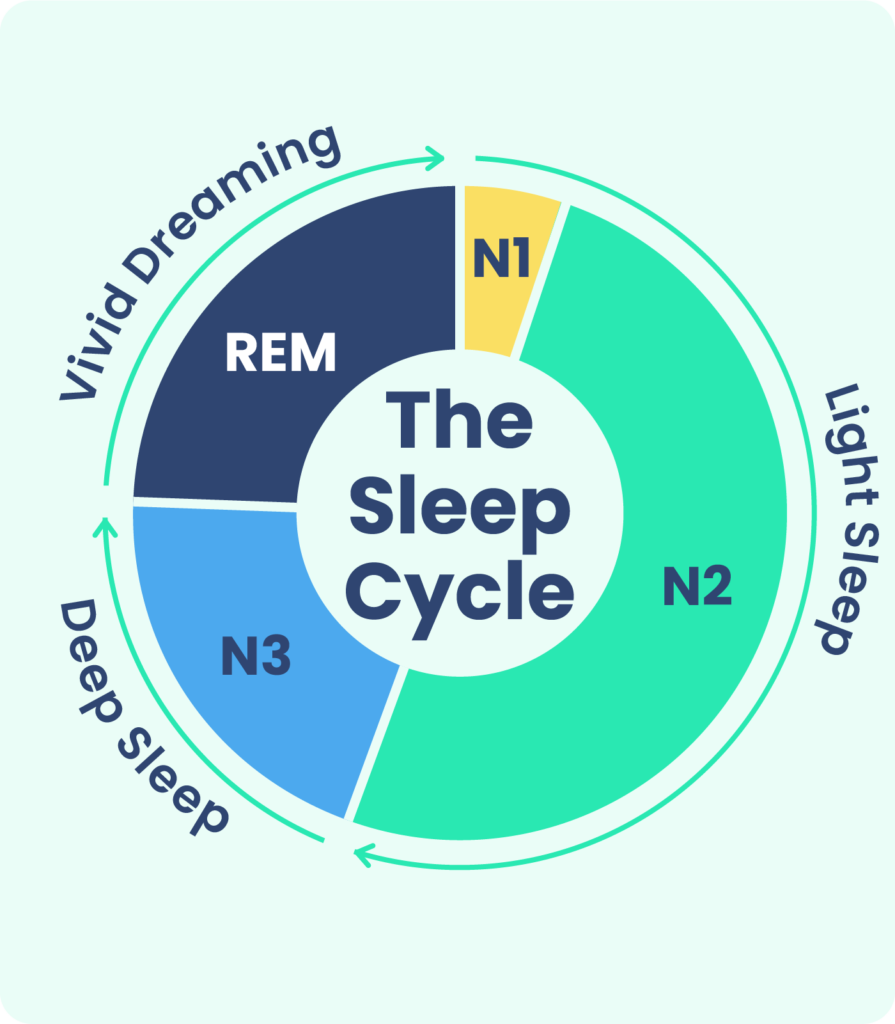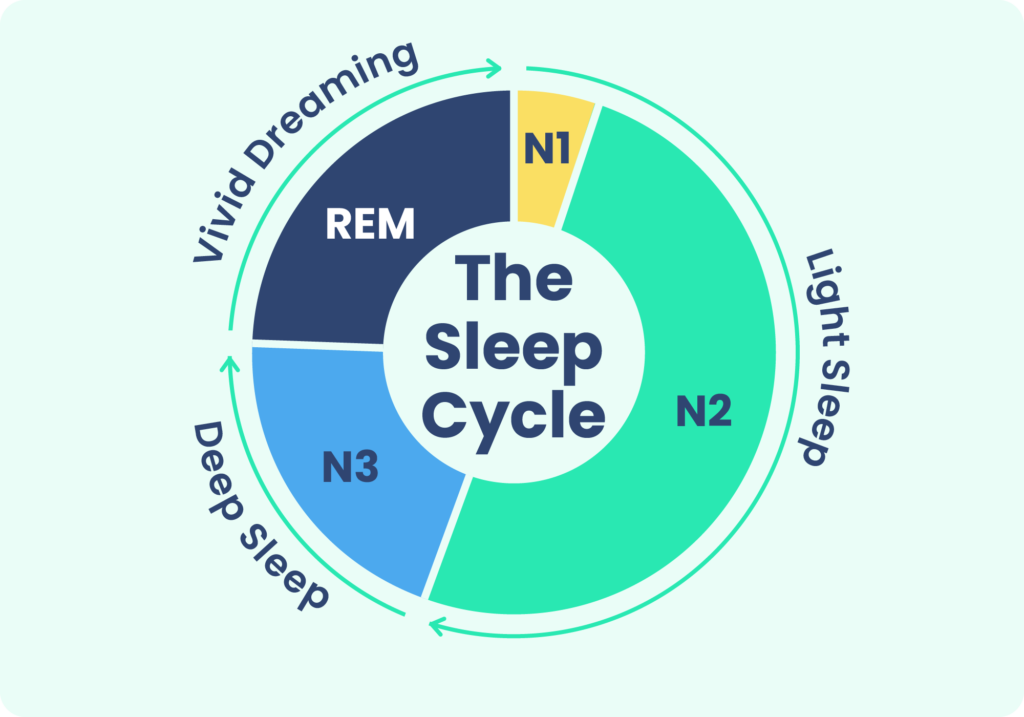What Is Healthy Sleep?
Healthy sleep involves getting enough uninterrupted sleep on a regular basis. When you’re getting good sleep, it’s easy to take this vital body function for granted. But if you aren’t getting healthy sleep, everyday tasks like reading a book or paying attention during a meeting can feel challenging – and you’re more likely to get sick, have an accident, or forget something important.
Because your health and wellbeing depend on your ability to sleep well, it’s important to understand how sleep works and what you can do to support healthy sleep.
Your Sleep Patterns and You
Healthy sleep allows you to cycle through several stages of sleep multiple times every night. The sleep cycle progresses through three stages of non-rapid eye movement (non-REM) sleep – moving from light sleep to deep sleep – and concludes with rapid eye movement (REM) sleep, the stage in which dreaming takes place. Over the course of a night, non-REM sleep stages become gradually shorter, and REM sleep occurs in longer intervals.


This pattern is essential to getting a good night’s sleep. If your body has cycled through all sleep stages as many times as it needs to, you should:
- Wake up refreshed
- Feel clear-headed and capable of paying attention
- Look well-rested
- Feel in a good mood
- Have enough energy to get you through the day
Quantity vs. Quality: What’s the Difference?
Healthy sleep requires more than just sleeping for a certain number of hours. Sleep quantity is important, but for sleep to be satisfying and refreshing, it must also be of high quality – that is, without interruptions that disrupt the sleep cycle.
Sleep Duration
Sleep duration is the amount of sleep you get over the course of a night. Exactly how much sleep is necessary can vary from person to person and may change depending on life circumstances. For example, if you are pregnant, sick, or in the midst of a particularly demanding week, you might need more sleep than usual.
Experts recommend that adults get at least seven hours of sleep each night. Not getting the sleep your body needs can lead to sleep debt and can affect your health, mood, relationships, and your performance at work or school.

Sleep Continuity
One of the primary markers of sleep quality is sleep continuity, your ability to sleep continuously so that you can effectively cycle through all stages of sleep. Sleep disruptions might cause you to wake up and have trouble falling back asleep, but they can also be subtle enough that you don’t remember them in the morning. Common sources of sleep disruptions include:
- Sleep disorders, such as sleep apnea and restless legs syndrome
- Pain or discomfort
- Caregiving responsibilities
- Night sweats
- A noisy, bright, or hot sleep environment
- Snoring or movement of a bed partner
- Nighttime bathroom trips
Sleep continuity is vital to healthy sleep. Without it, you might have trouble waking up in the morning or feeling energized throughout the day, even if you’ve spent plenty of time in bed.
Your Sleep Schedule Matters
One of the best ways to ensure that you get healthy sleep is to commit to a consistent sleep schedule. Going to bed and getting up at the same time every day can help you get the amount of sleep you need, as long as you budget seven or more hours for sleeping.
A regular sleep schedule can also help boost the quality of your sleep. That’s because of your body’s circadian rhythms – the natural, biological cycles that operate according to a 24-hour internal clock. Your circadian rhythms influence:
- When you feel ready to sleep and wake up
- How your body cycles through the stages of sleep
- Your ability to sleep continuously through the night
Both your environment and your behaviors affect your circadian rhythms. For example, darkness is a sleep cue that triggers production of the sleep-inducing hormone melatonin. Similarly, having a regular bedtime – especially one preceded by a bedtime routine – can serve as a sleep cue that supports healthy sleep and aligns your circadian rhythms with your preferred sleep schedule.
Signs You May Need a Sleep Check-Up
You may not be getting enough high quality sleep if you:
- Find it hard to get out of bed in the morning
- Feel daytime tiredness
- Nod off during meetings, while riding in car, or while watching TV
- Have difficulty paying attention or remembering information
- Experience brain fog or feel “out of it”
- Feel moody, anxious, or depressed
- Have more conflict than usual with family members, romantic partners, or co-workers
Establishing healthy sleep habits can help you improve the quality of your sleep.
However, if you make changes to support healthy sleep and continue to experience these problems or have trouble sleeping, you should talk to your doctor. Don’t wait to talk to your doctor if you suspect your sleep problems are the result of an underlying medical or mental health condition.
Our Best Tips to Get a Good Night’s Sleep – Every Night
Set yourself up to get a good night’s sleep every night by adopting healthy sleep hygiene practices. In addition to maintaining a consistent sleep schedule, it’s important to:
- Get at least 30 minutes of sunlight first thing in the morning
- Limit naps to 20 minutes in the early afternoon
- Engage in a nightly bedtime routine with relaxing activities, such a reading or stretching
- Ensure that your bedroom is cool, dark, and quiet
- Exercise for at least 30 minutes during the day
- Avoid screen time as you are winding down for the night
- Avoid alcohol, nicotine, and caffeine in the hours before bedtime

Still have questions? Ask our community!
Join our Sleep Care Community — a trusted hub of sleep health professionals, product specialists, and people just like you. Whether you need expert sleep advice for your insomnia or you’re searching for the perfect mattress, we’ve got you covered. Get personalized guidance from the experts who know sleep best.
References
3 Sources
-
Cirello, C. (2023 November). Insufficient sleep: Definition, epidemiology, and adverse outcomes. In R. Benca & A. Eichler (Ed.). UpToDate., Retrieved December 12, 2023, from
https://www.uptodate.com/contents/insufficient-sleep-definition-epidemiology-and-adverse-outcomes -
Paruthi, S., Brooks, L. J., D’Ambrosio, C., Hall, W. A., Kotagal, S., Lloyd, R. M., Malow, B. A., Maski, K., Nichols, C., Quan, S. F., Rosen, C. L., Troester, M. M., & Wise, M. S. (2016). Recommended Amount of Sleep for Pediatric Populations: A Consensus Statement of the American Academy of Sleep Medicine. Journal of clinical sleep medicine : JCSM : official publication of the American Academy of Sleep Medicine, 12(6), 785–786.
https://pubmed.ncbi.nlm.nih.gov/27250809/ -
Reddy, S., Reddy, V., & Sharma, S. (2023 May). Physiology, Circadian Rhythm. StatPearls.
https://www.ncbi.nlm.nih.gov/books/NBK519507/




















































